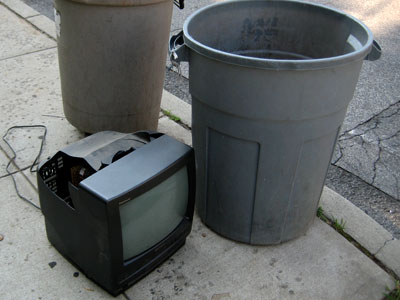
Peerless Television Service and Repair
|
Call Me Peerless
Albertine and I had returned to Manhattan after a wandering road trip to New Mexico and back, and we were enjoying a martini at the Pogo Club, a cocktail lounge on Houston Street that hadn’t existed when we left. Its entrance was nearly unmarked; beside the door of a nondescript building, a discreet brass plaque bore its name in small type. Inside the door, a narrow set of stairs led to the second floor, and there one found oneself in a quiet and sumptuous hideaway. We were sitting at the bar, sipping our drinks, congratulating ourselves on a trip successfully completed, and saluting a city whose citizens are so clever and generous that they had opened this handsome watering hole in anticipation of our return, when we overheard a burly man next to us declare, “Martini prices have skyrocketed!”
We glanced in his direction and saw that he was examining his check.
“So have housing prices,” said his companion, a redheaded woman not nearly so burly. “They have literally skyrocketed.”
Albertine looked at me and raised an eyebrow. “Did you hear that?” she asked silently, inviting me to read her luscious lips.
I answered with an eloquent shrug that said, “He’s probably one of those burly guys given to exaggeration.”
During our time on the road, we hadn’t paid any attention to the cost of Manhattan housing. We had been housing ourselves in hotels, motels, and country inns. We hadn’t even decided whether we would return to the city when our traveling was done. We hadn’t even been sure that our traveling would ever be done. Now, however, we were.
The next day, we checked the real estate listings.
“Housing prices have skyrocketed,” muttered Albertine.
“Yeah,” I growled. “So have martini prices.”
“We’re going to have to find a place where the prices haven’t rocketed quite so high.” she said.
“Outside the city?” I asked.
“I’m afraid so, unless we could squeeze ourselves into a very small apartment.”
“How small?”
“One bedroom, I think,” she said.
“That would mean one bathroom,” I said.
“I’ll undertake an online survey of the surrounding suburbs,” she said at once. “We’ll find something.”
We weren’t in a hurry, but we were impatient. All of our belongings were in storage, and we were shuttling among friends, squeezing ourselves into their apartments for a night or two and then moving on.
Because we were impatient, we did something that we had done before: we chose a place that we could move into easily and stay in comfortably for a year or so while we looked for something better.
In this case, the place was Babbington, the town where I had spent my boyhood, the town where Albertine and I had met, where we had fallen in love. There we rented a house for about one-third the price of a comfortable apartment in Manhattan. It was small but newly renovated and comfortable. It seemed to have only one shortcoming: it wasn’t as close to the train station—and, therefore, Manhattan—as we would have wished it to be.
One morning after we had settled in, I was sitting in my new workroom, staring at my computer screen, wondering what to do next, or, to be completely accurate, wondering what I would be willing to do next. I had a long list of things that I ought to do, but there wasn’t anything on that list that I wanted to do. I did have a list of things that I wanted to do, at the top of which was writing Albertine Appears, a volume of my memoirs that would tell the story of our meeting, but on this morning I was trying not to think of any of the things that I wanted to do because I knew that none of them was likely to bring us any money, which meant that even thinking about one of them in place of doing at least a lick of work on something that would bring us some money would be the equivalent of losing money. I sighed. I resigned myself to working on something that I didn’t want to do. I was just about to begin when the telephone rang. I let it ring until my recorded voice said, “You’ve reached Memoirs While You Wait. Please leave a message.”
After a moment of hesitation, a voice on the other end of the line said, “Hello?” After another hesitation, the voice asked, “Are you Peerless?”
That was a question that demanded a response. I picked up the handset and said, with confidence, “Yes, I am, and I have testimonials to prove it, if you require them.”
“That’s good,” said the voice. “I’m glad to hear that, because a lot of you people don’t have a great reputation.”
“Sad, but true,” I said. “Many of my fellow ghosts are unscrupulous, and many more are incompetent.”
“Ghosts?”
“Ghostwriters,” I said. “Or, if you prefer, co-authors. Or collaborators.”
“I don’t know who you are, but I’m thinking you’re not Peerless Television Service and Repair, are you?”
“No,” I said, “I’m not.”
“You said you were Peerless when I asked.”
“In the ghosted-memoir racket, I am,” I said. “Peerless. Honest. Without peer. Utterly. Hello? Hello?”
|
|
|
|
|
|





